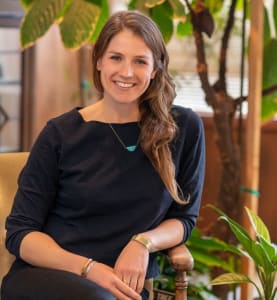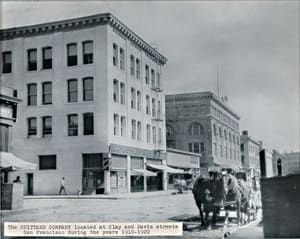From the Gold Rush to Kosher Parve: The Legacy of Guittard Chocolate
Introduction to Guittard Chocolate’s Legacy
We sat down with Amy Guittard, the fifth-generation Chief Marketing Officer of Guittard Chocolate and the first woman to join the company’s management team. Tracing its roots back to 1868 in San Francisco, this family-owned business has weathered the Great Earthquake, relocations, and changing consumer tastes while upholding an unwavering commitment to quality. Amy provides insights into their newly launched kosher dairy free pareve line, sourcing strategies that prioritize sustainability, and the art of preserving flavors from farm to factory.
Company Overview and Amy’s Role
OU Kosher: Amy, can you give me a general overview of what Guittard does and what your role is?
Amy: Guittard was founded in 1868 by my great-great-grandfather Etienne. Originally from France, he first came to the US in pursuit of gold, where he brought chocolate to barter for mining supplies. Upon arrival, he saw that merchants were making more money than gold miners. So, he went back to France to master chocolate-making and returned to San Francisco to set up shop along the Embarcadero, a hub for businesses at the time. As chocolate-making is a grinding business, our company didn’t limit itself to chocolate; we also processed coffees, teas, and spices. Following the 1906 earthquake that devastated our factory and much of San Francisco, we rebuilt and narrowed our focus to chocolate exclusively. We’ve been in the Bay Area since our founding, moving to Burlingame in the early ’50s after a freeway development forced us out of San Francisco. Now our main facility is on Guittard Rd., named due to the remote location at the time of our move. We also have a second, state-of-the-art facility in Fairfield, just north of San Francisco, which includes our new kosher pareve, dairy-free line.
As for my role, I’m the Chief Marketing Officer and the fifth generation in our family business. I work closely with my father, who represents the fourth generation. I’ve been here for about 12 years, overseeing marketing, and though we primarily conduct business-to-business sales, supplying chocolate as an ingredient, we also have a retail line available in premium natural grocery stores. Approximately 80% of our business involves selling chocolate to various industries, from ice cream manufacturers to professional kitchens.
Kosher Product Range and Women’s Role in the Company
OU Kosher: Regarding kosher manufacturing, is it just chocolate chips, or do you have a range of products?
Amy: Yes, we have a variety of kosher products that come off our new refining line, including chips, and wafers; we also offer Kosher pareve cocoa powders.
OU Kosher: Looking at your history, are you the first woman to be involved in the family business?
Amy: Yes, I am the first woman.
OU Kosher: Good for you.
Amy: Thanks. It’s one of those things that comes up every once in a while. And while it’s true, our company is family-owned and operated, we have multiple generations of employees and customers all of whom are part of our extended family – and many women have been part of our story long before I came on board. Not to mention many women in our family who have been involved informally over the years. So yes, on paper that’s true but in actuality, I’m simply following in the footsteps of many others.
Sustainability and Supply Chain Management
OU Kosher: Now, regarding the cost of cocoa, can you discuss your approach to sustainability and supply chain management?
Amy: Cocoa grows 10-15 degrees either side of the equator in what’s known as the Cocoa Belt. We source our cocoa from all around the world – from Madagascar to Ecuador, and many other countries, even as far north as Hawaii. The diversity of flavor that we source from this wide array of regions is crucial for the premium flavors we seek in our chocolate.
We engage closely with our origin partners, including farmers and cooperatives, and collaborate with origin governments and their research institutes to preserve and protect unique flavors and heirloom varieties. Instead of just breeding for disease resistance and productivity, institutions are taking into account what the beans will taste like. Good flavor can warrant premiums; pre- and post-harvest practices significantly contribute to this. We work directly with farmers to refine fermentation and drying processes, all before the cocoa reaches our factory. By training on the importance of flavor – be it through planting materials, pre-harvest and post-harvest practices – we’re able to pay premiums to farmers that are then reinvested in farms, communities and environmental initiatives like agroforestry.
Consistency and Quality Control
OU Kosher: How do you maintain consistency of flavor from harvest to harvest?
Amy: It’s all about partnership and due diligence. We receive pre-shipment samples for every lot and all raw materials that we purchase to make our chocolate —not just cocoa beans, but other ingredients like sugar and dairy —are assessed by our Quality Control department. They’re the gatekeepers of flavor. Every ingredient undergoes rigorous testing in our lab, including a cut test for cocoa beans, which reveals any defects or quality issues. We also conduct daily tastings with a group that meets to ensure that both our supply and crafting processes maintain consistent quality.
OU Kosher: Are you part of the tasting group?
Amy: I was actively involved in daily tastings when I first joined (I called it Tasting Bootcamp); I get a calendar reminder every day at 11 but I don’t always make it out to the lab. That said, I do taste chocolate multiple times a day every day and my father is still heavily involved in daily tastings and ensuring our quality standards.
Kosher Certification Journey
OU Kosher: What was the catalyst for getting kosher certification?
Amy: All of our products have been kosher dairy ever since our association with OU. This was way before my time. We had other products that were OU kosher-certified. Last year, in 2023, we achieved kosher pareve certification. We’ve had kosher dairy certified chocolate and cocoa for decades. Our cocoa powders have been kosher pareve. With the kosher pareve certification for chocolate obtained last year, it’s now accessible to a broader audience.
OU Kosher: How does kosher certification factor into your marketing? Do customers specifically ask for it?
Amy: Yes, kosher certification is definitely a must-have for some of our customers, which is why we’re excited to offer it. Our chocolate has many attributes we’re proud of, including being organic, tree nut-free, peanut-free, and gluten-free. Our dairy-free line has zero traces of dairy which complements our kosher pareve certification. This certification is part of our long-term goal to cater to diverse customer needs and is aligned with our series of products that are also free from 14 major allergens and sensitivities. It’s a testament to our quality, accountability, and food safety.
Business Model and Consumer Products
OU Kosher: What percentage of your business is B2B versus consumer?
Amy: About 80% is B2B, and the remainder is consumer. We offer home bakers kosher pareve cocoa powders and three different kosher pareve baking chips. We have a far more extensive offering for our wholesale customers – powers, chips, and wafers in varying percentages.
OU Kosher: How many times have you updated your logo?
Amy: When I came on board in 2012, I did a bit brand refresh. We streamlined various logos, including removing a few heritage logos and elements. Our current logo merges my great-great-grandfather’s signature with the old retail logo. We prefer gradual updates to maintain brand relevance rather than large overhauls.
OU Kosher: Do you use your history and sustainability efforts in consumer marketing?
Amy: Absolutely. Consumers value sustainability in their purchases. It’s integral to our business and marketing, given our longstanding chocolate-making heritage. Our products are Fair Trade certified, and we engage in additional on-ground programs beyond certification, emphasizing flavor preservation, environmental preservation and honorable sourcing.
Innovation and Product Development
OU Kosher: Do you have a product development department?
Amy: Yes, we have an R&D team along with two pastry chefs. They collaborate closely, particularly when we’re developing products for pastry chefs, confectioners, and the professional food service sector. For consumer products, they are typically part of our innovation pipeline, aiming to position us as leaders in the premium chocolate space. The R&D team works with a cross-functional team to bring new items to market. They also respond to customer inquiries, sometimes sparking inspiration for new product ideas. We like to think of ourselves as a 150-year-old start-up, constantly innovating and exploring new ideas like our Kosher pareve certification, which, while not a new product, opens up a new market for us, especially with our expansion to dairy-free and other allergen-conscious consumers.
OU Kosher: Are your B2B customers identifying you on the packaging of your products?
Amy: Some of our customers choose to include our brand on their packaging, which we greatly appreciate. It’s not unusual for consumers to enjoy our chocolate in various products like ice creams, energy bars, or cookies without realizing it. Some customers list ‘Guittard chocolate’ in their ingredients, and others highlight our chocolate on the front of the pack. We believe it adds value to their product by underscoring quality, and consumers appreciate this transparency. Chocolate holds a nostalgic place in people’s lives, so when it’s called out on a package, it tends to resonate well.
Advice and Company Ethos
OU Kosher: Do you have any advice for others in your role?
Amy: It’s crucial to stay creative, listen actively, and collaborate. Listening—to the market, customers, and competitors—is fundamental. It’s also important to trust your gut and stay true to your beliefs rather than following the crowd. Perhaps my perspective is influenced by my new role as a mother, but maintaining authenticity in your actions is key.
OU Kosher: Your company ethos seems focused on commitment to quality. How challenging is that?
Amy: Maintaining quality over a long period is indeed challenging, but trust is a key component of our brand. We emphasize values like curiosity and continuous improvement, aiming to run a thoughtful business that contributes positively to the world. Chocolate is just one avenue through which we seek to do this.
OU Kosher: How do you manage the intersection of family and business in such a long-standing family-owned company?
Amy: Chocolate and cocoa are common threads in our family discussions, and we often indulge in our products together. We are tight-knit and dedicated to our collective vision, which has supported our longevity in the industry.
OU Kosher: It sounds like you guys all get along given your longevity.
Amy: Yes; I’d say we like each other.
OU Kosher: Thanks for your time. It’s been great talking to you, I really appreciated the conversation.
Amy: We definitely appreciate being part of it. Thank you.





